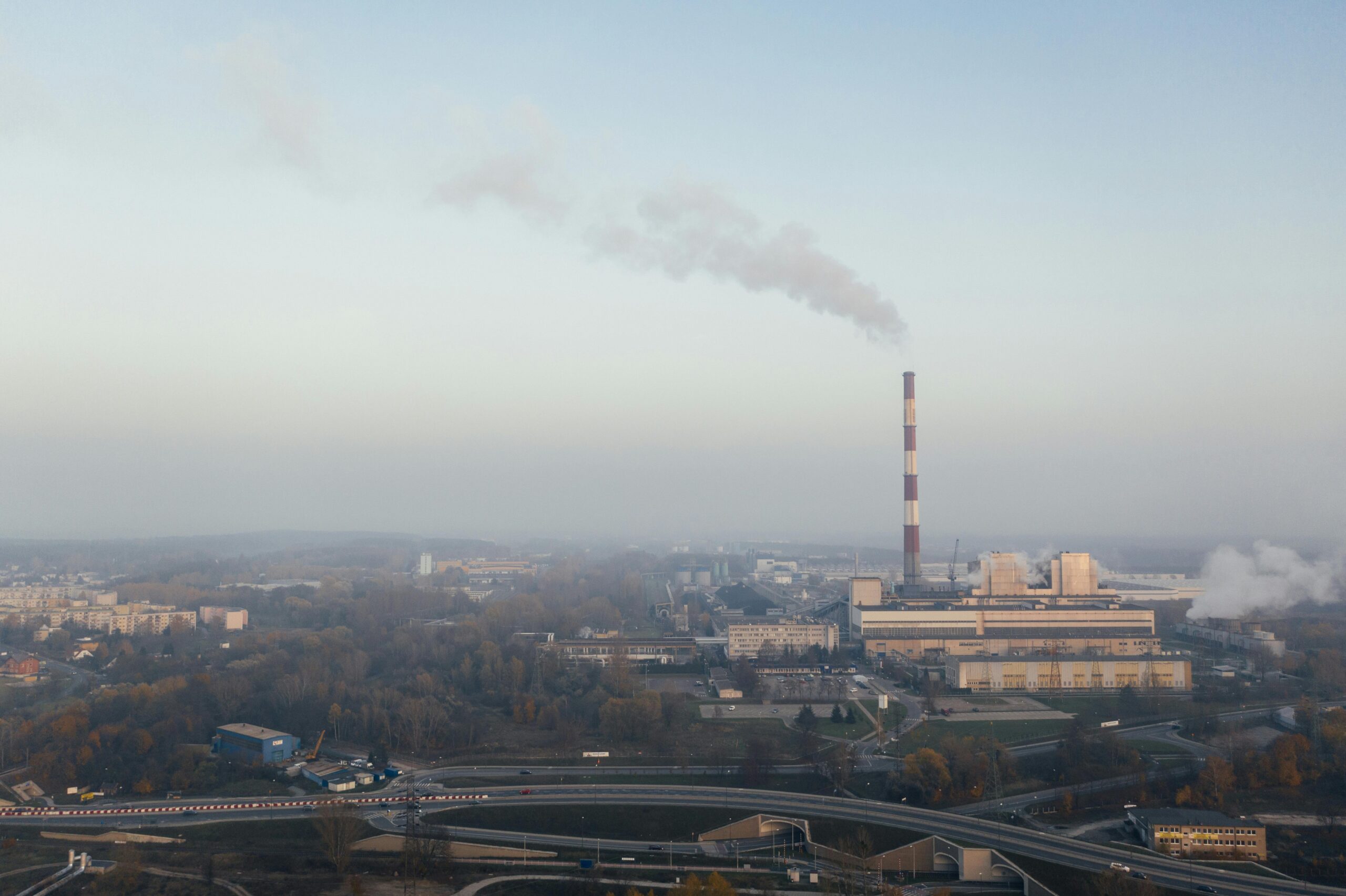Malta was hit hard by the COVID-19 pandemic, with the key economic pillar of tourism taking a steep nosedive in the second quarter of 2020, and remaining depressed throughout the rest of the year.
Now, a new release from the National Statistics Office (NSO) brings together a number of indicators to provide a detailed overview of the impact of the COVID-19 pandemic on Malta’s tourism, public finances, transport and labour market.
It lists a number of indicators that were directly affected by this pandemic and illustrates how these figures developed up until the end of 2020.
The first case of COVID-19 was identified in Malta on 6th March 2020. By the end of March, the total number of new cases had reached 169, while by the end of the year, this number stood at 12,774.
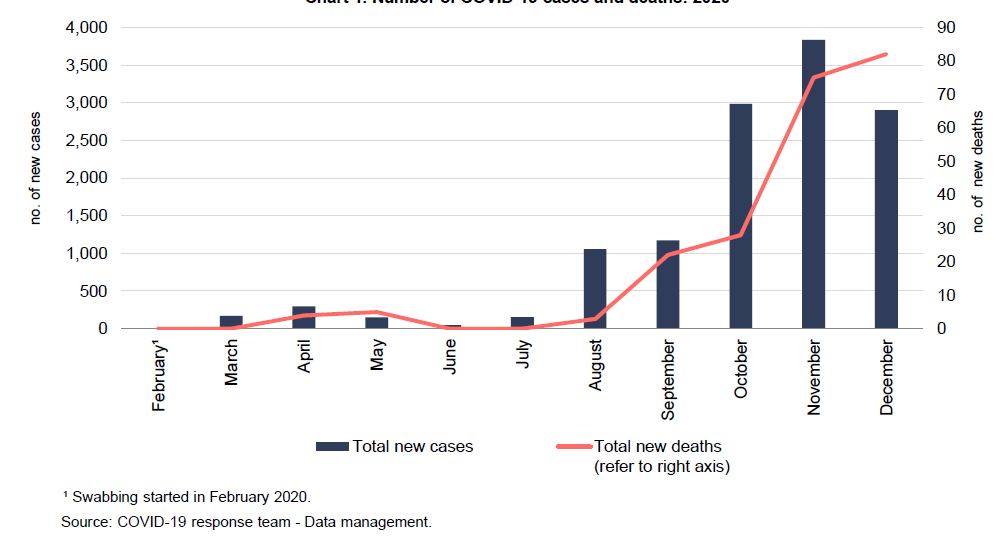
On 8th April 2020 the first person passed away while COVID-19 positive. This reached 219 persons by the end of the year. The number of new cases detected peaked in November (3,831), whereas the highest number of deaths was recorded in December (82).
Most of the indicators affected by the pandemic were impacted mostly during the second quarter of 2020, with slight improvements observed in the third and fourth quarters.
Tourism
The tourism industry was negatively hit predominantly by travel restrictions and a reduction in demand among travellers.
Up until 2019, inbound tourism was registering a year-on-year increase, with an adverse trend being brought about by the pandemic. Total inbound tourists for 2020 amounted to 658,567, declining by 76 per cent from 2019.
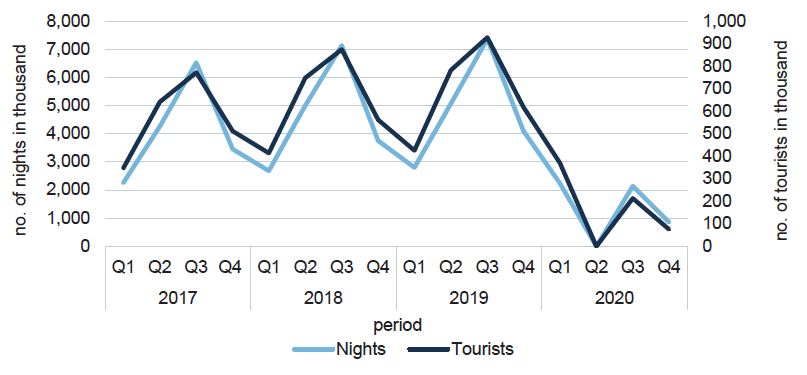
Decreases were also registered for total nights spent by inbound tourists and total expenditure, with drops of 73 and 80 per cent respectively.
During the second quarter of 2020, all passenger flights were suspended due to restrictive measures, resuming operations in July. Despite the reopening of the airport, the second half of the year saw a drop of 81 per cent in total inbound tourists, resulting in a decline of 74 per cent in total nights spent and 83 per cent in total expenditure, when compared to the second half of 2019.
Economy, Public Finances, and Businesses
As expected, the COVID-19 pandemic also had a negative impact on key macroeconomic indicators.
In 2020, nominal Gross Domestic Product (GDP) amounted to slightly less than €13 billion, a contraction of nearly six per cent over 2019. Economic activity was most severely affected in the second quarter of 2020, declining by more than 13 per cent.
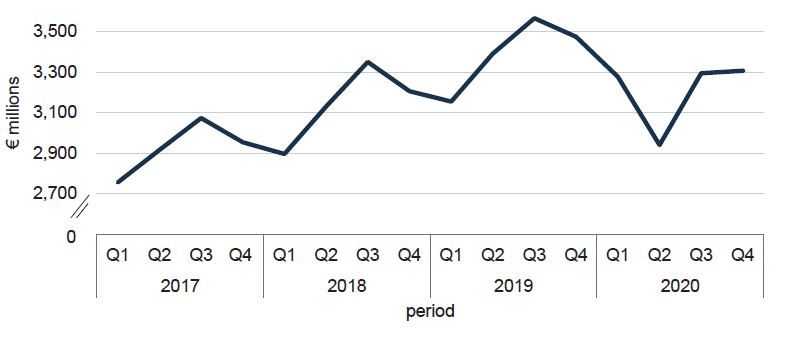
During the last two quarters of the year, the economy started showing signs of gradual recovery, but still registered declines compared to the previous year.
Subdued economic activity resulted in weaker price pressures. In 2020, the annual rate of inflation as measured by the Retail Price Index (RPI) averaged 0.64 per cent, down from 1.64 per cent in the previous year.
Inflation had been on a downward trend since the third quarter of 2019, however continued to ease since the onset of the pandemic, reaching a low of 0.27 per cent by the fourth quarter of 2020.
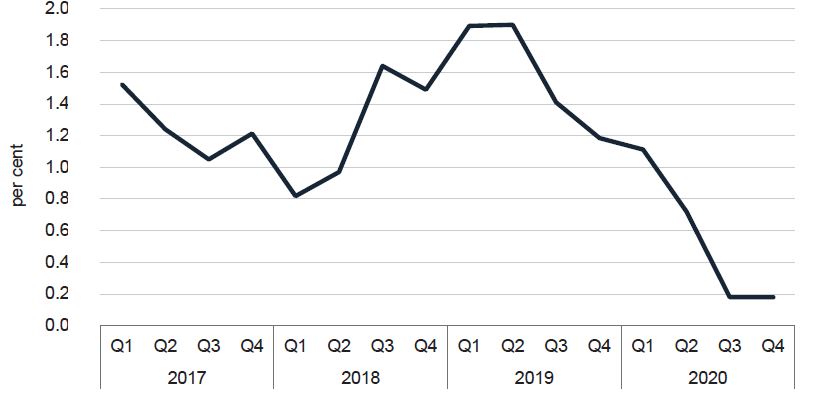
In 2020, a trade in goods deficit of €1,978 billion was registered, 45 per cent lower than the deficit recorded in the previous year. This improvement was the result of a drop in imports which exceeded two billion euro, which was partially offset by the decline in exports of less than €500 million.
With regard to quarterly developments, exports exhibited a decrease in the last three quarters of 2020 when compared to 2019, after registering an increase in the first quarter. On the other hand, imports recorded a decrease in all quarters of the year under review. The largest decline in both exports and imports was observed in the third quarter of 2020.
The Government’s Consolidated Fund registered a deficit of nearly €1.5 billion in 2020, compared to a surplus of around nine million euro recorded in 2019. This reflected lower revenue as a result of weaker economic activity, coupled with higher expenditure to mitigate the adverse impact of the pandemic.
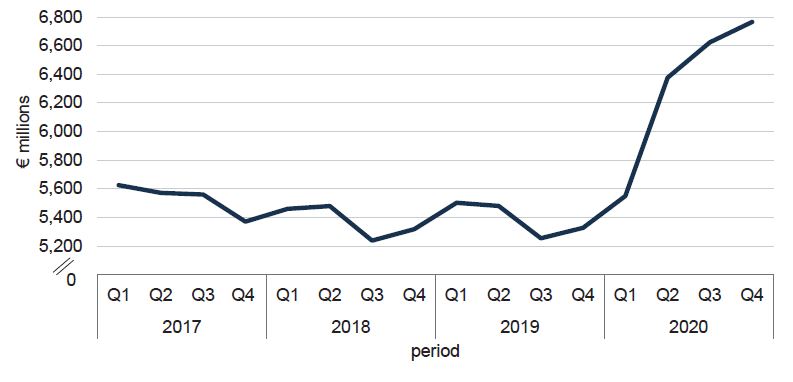
In 2020, a total outlay of €384 million related to the COVID-19 Business Assistance Programme, a further €45 million was spent on the COVID-19 Economic regeneration voucher scheme and more than €14 million were directly related to COVID-19 Social benefits.
A deficit was reported in all quarters of 2020, with the largest being that of the second quarter, which nearly amounted to €600 million.
Developments in Government’s fiscal balance translated into a rise in government debt, which reached almost seven billion euro by the end of 2020, an increase of 27 per cent over the corresponding period of 2019.
The index of Industrial Production declined marginally in 2020 by 0.3 per cent over the previous year. This index was at its lowest during the second quarter of 2020.
Concurrently, the index of services turnover decreased by 14.5 per cent in 2020 when compared to 2019. The services industry index also reached its lowest levels in the second quarter of 2020.
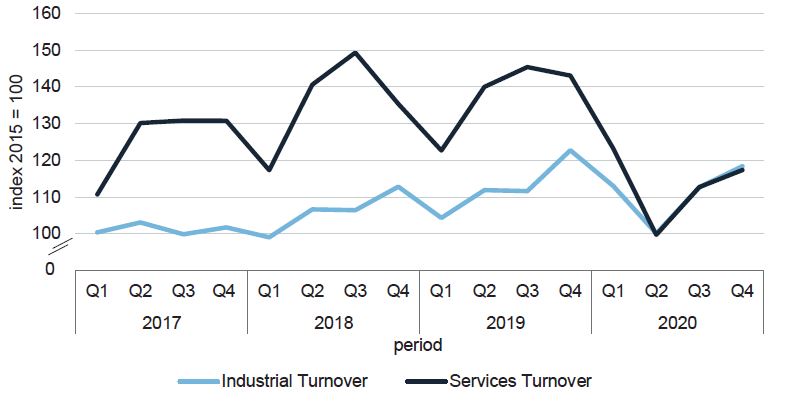
Transport
The unprecedented decreases in inbound tourism, accompanied by changes in lifestyle and consumer behaviour, impacted road transport patterns.
The number of newly licensed motor vehicles in 2020 stood at 19,480, the lowest in recent years. This represented a decrease of slightly more than 27 per cent over 2019. The second quarter of 2020 registered the lowest number of newly licensed motor vehicles, at 3,679.
This same pattern could be observed in road traffic accidents, which dropped by 25 per cent in 2020 when compared to 2019 levels to 11,950 accidents.
Sea transport data showed that the number of passengers and vehicles travelling between the Maltese islands during 2020 totalled 3,773,981 and 1,552,138, respectively. This meant a decrease of 36 and 13 per cent respectively, when compared to 2019.
Once again, the largest disruption occurred during the second quarter of 2020, when a decrease of almost one million passengers and 172,372 vehicles was recorded over the same quarter of 2019. Although increasing slightly in subsequent months, a substantial decline was still witnessed in comparison to the corresponding period of the previous year.
Labour Market
Data from the Labour Force Survey showed that the share of employed males in 2020 stood at 68 per cent, a decrease of 0.6 percentage points when compared to 2019. Conversely, the share of unemployed males increased by 0.6 percentage points whereas those inactive remained at the same level recorded during the previous year.
The share of employed females aged 15 years and over reached almost 51 per cent, an increase of 1.4 percentage points when compared to 2019. The share of unemployed females rose by 0.3 percentage points while the share of inactive females declined by 1.7 percentage points.
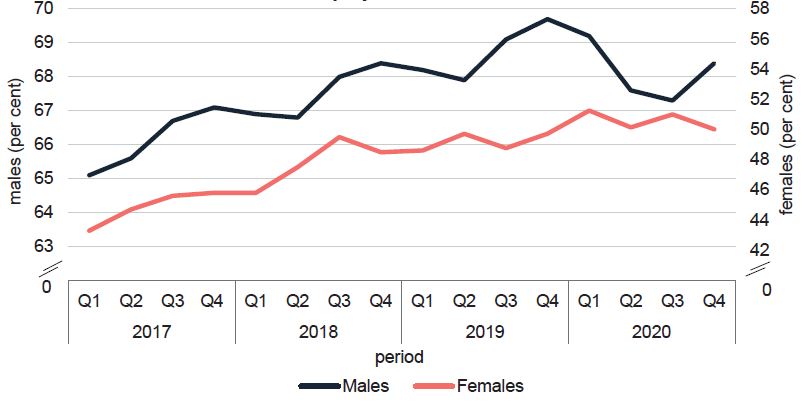
Turning to the number of actual hours worked, on average, employed persons worked 33.8 hours per week in 2020, the lowest in recent years. This was largely influenced by the considerably low number of hours worked during the second quarter of the same year. In this regard, in the second quarter, this average stood at 31.6 hours per week.
Broken down by sex, in 2020, the average working hours for males stood at 35.9, a decrease of 3.5 hours over 2019. Furthermore, the average working hours for males in full- and part-time employment were 37.1 and 15.9 respectively.
On the other hand, the average working hours in 2020 for females stood at 30.8. Similar to the situation among males, females also experienced a significant reduction in their working hours.
Those employed in full-time jobs worked almost three hours less while those in part-time employment worked just over two hours less, when compared to the previous year.
Non-fatal accidents at work for persons aged 15 to 64 years exhibited a decline, with 2020 registering 2,328 accidents. This was a decrease of 930 accidents over the previous year. The lowest number of non-fatal accidents at work was registered in the second quarter of 2020 and stood at 516.
Malta’s youth population down by 15,000 in 10 years: What does this mean for the labour market?
'The challenge today goes beyond attracting talent – it’s about retaining it'
MBB urges caution over EU’s 2040 climate targets, citing risks for Maltese businesses
'The proposed target presents both opportunities and challenges'
db Foundation raises €8,419 for Karl Vella Foundation with MasterChef Malta Charity Dinner
These events form part of the db Foundation's ongoing commitment to supporting vulnerable members of society through impactful initiatives





